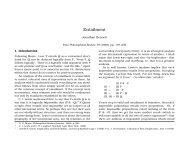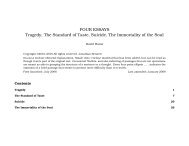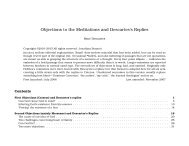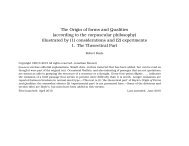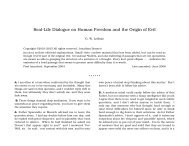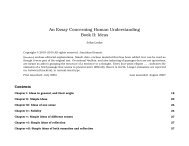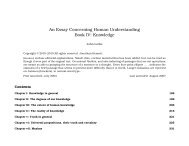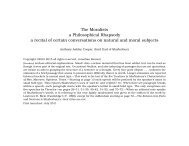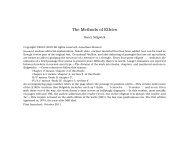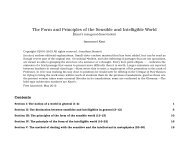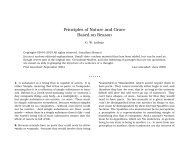A Vindication of the Rights of Woman with - Early Modern Texts
A Vindication of the Rights of Woman with - Early Modern Texts
A Vindication of the Rights of Woman with - Early Modern Texts
Create successful ePaper yourself
Turn your PDF publications into a flip-book with our unique Google optimized e-Paper software.
The <strong>Rights</strong> <strong>of</strong> <strong>Woman</strong> Mary Wollstonecraft<br />
accomplishment: That is a kind <strong>of</strong> sneer-word when MW<br />
uses it writing about <strong>the</strong> ‘accomplishments’ that women<br />
are trained to have. To ‘accomplish’ something can be to<br />
complete or finish it; a few decades ago some young women<br />
were sent to a ‘finishing school’ before being launched into<br />
society.<br />
address: skill, elegance, dexterity; usually thought <strong>of</strong> (by<br />
MW at least) as something learned, practised, contrived—not<br />
natural. See page 58.<br />
amuse: In MW’s time ‘amuse’ had a central meaning which<br />
it now has only at <strong>the</strong> margins: to ‘amuse oneself by. . . ’ was<br />
to pass <strong>the</strong> time by. . . . A child who is ‘amusing herself’ by<br />
dressing her doll (page 29) needn’t be taking much pleasure<br />
in this.<br />
animal spirits: These figured in a <strong>the</strong>ory, popularised<br />
by Descartes: <strong>the</strong>y were supposed to be an extremely<br />
fine-divided liquid or gas—much less lumpy than water or<br />
air—that could move <strong>with</strong> great speed and get in anywhere;<br />
among <strong>the</strong>ir roles was to transmit causal influences from <strong>the</strong><br />
sense-organs to <strong>the</strong> brain, almost instantaneously.<br />
brute, brutal: A brute is a lower or non-human animal. A<br />
brutal or brutish way <strong>of</strong> behaving is one that falls below<br />
a minimum standard for being human—e.g. <strong>the</strong> ‘brutal’<br />
behaviour <strong>of</strong> a mo<strong>the</strong>r [on page 89] who indulges her child<br />
<strong>with</strong>out thinking about <strong>the</strong> effects <strong>of</strong> her conduct on <strong>the</strong><br />
child’s later development or on •o<strong>the</strong>r people.<br />
docile: Strictly and originally this meant ‘able to learn’<br />
and/or ‘willing to learn’. In MW’s usage, as in ours today,<br />
a ‘docile’ person is one who is easy to manage, persuade,<br />
manipulate, etc. One who is biddable.<br />
Glossary<br />
education: In MW’s time this word had a wider meaning<br />
than it tends to have today. It wouldn’t be far wrong to<br />
replace most occurrences <strong>of</strong> it by ‘upbringing’. See MW’s<br />
discussion <strong>of</strong> ‘education’ starting on page 14.<br />
genius: In <strong>the</strong> present work this means something like<br />
‘extremely high-level intellect’; similar to <strong>the</strong> word’s present<br />
meaning, but not as strong.<br />
he or she: MW never uses ‘he or she’, ‘his or hers’ or <strong>the</strong> like.<br />
These occur in <strong>the</strong> present version to avoid <strong>the</strong> discomfort<br />
we feel in her use <strong>of</strong> ‘it’, as when she says ‘every being’ can<br />
become virtuous by <strong>the</strong> exercise <strong>of</strong> ‘its own reason’.<br />
(im)mortal: MW ties •being immortal to •having reason and<br />
to •being anwerable to God.<br />
mistress: In this work, a ‘mistress <strong>of</strong>’ a family is in charge<br />
<strong>of</strong> a family; and a ‘mistress <strong>of</strong>’ a man is a sexual partner <strong>of</strong> a<br />
man. The word is not used here except in those two kinds <strong>of</strong><br />
context.<br />
person: When MW refers to a woman’s ‘person’ she is<br />
always referring to <strong>the</strong> woman herself considered as sexually<br />
attractive. A man’s interest in a woman’s ‘person’ is his<br />
sexual interest in her body, though clothing and jewellery<br />
may also come into it.<br />
prescription: In several important places MW uses ‘prescription’<br />
in its sense as a legal term, now obsolete, referring to<br />
something’s being accepted or unchallenged etc. because it<br />
has been in place for so long.<br />
sceptre: An ornamental rod held in <strong>the</strong> hand <strong>of</strong> a monarch<br />
as a symbol <strong>of</strong> royal authority. MW uses <strong>the</strong> word several<br />
times, always as a metaphor for power or authority: ‘beauty



